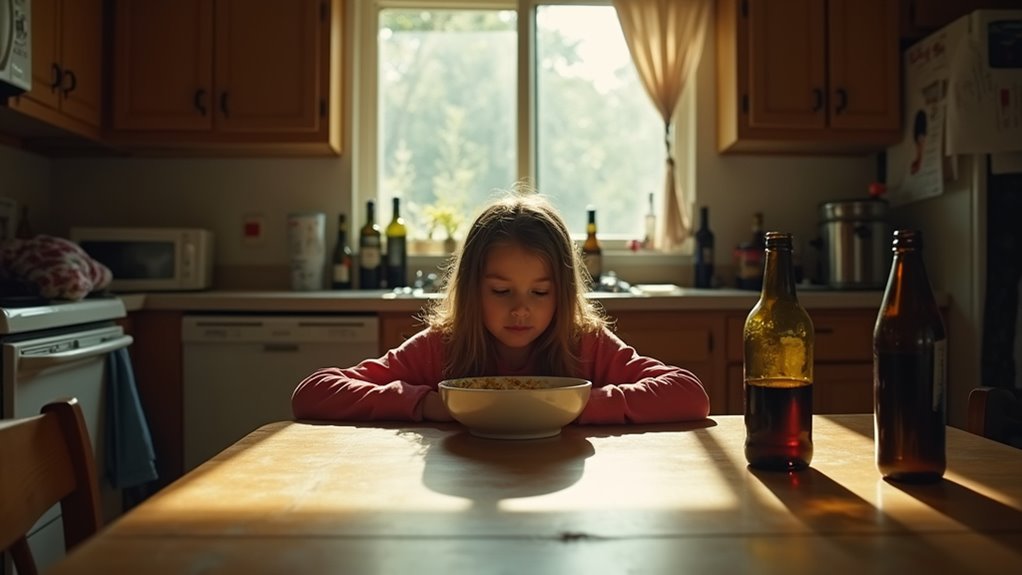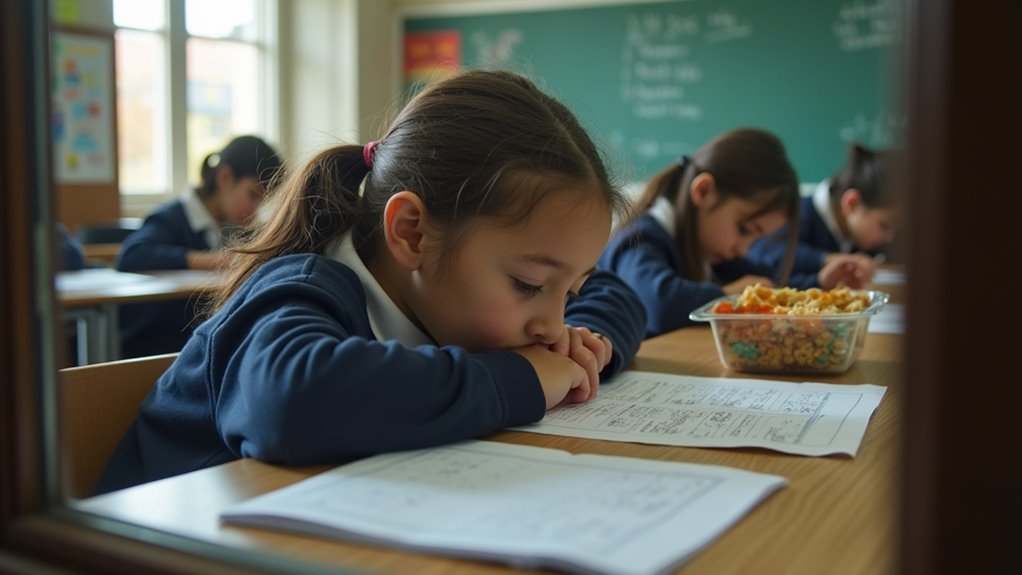When your parent struggles with addiction, you’ll likely experience significant behavioral and emotional challenges. You may develop trust issues, difficulty regulating emotions, and problems forming healthy relationships. Children often take on inappropriate adult roles, struggle academically, and face higher risks of anxiety, depression, and PTSD. These effects can persist into adulthood, creating cycles of destructive patterns but understanding these impacts is the initial step in the direction of breaking free from their influence.
The Hidden Crisis: Understanding Parental Addiction Statistics

While many societal issues receive widespread attention, the devastating impact of parental addiction often remains shrouded in silence, affecting a staggering 21 million children across the nation. The substance abuse prevalence reveals that 7.5 million children live with a parent struggling with alcohol use disorder, while 12.2% face exposure to parental marijuana use.
The data shows that children under three are particularly at risk, with 1.2 million exposed to parental alcohol disorders. What’s more concerning is that 4.7% of all children have a parent with diagnosed alcohol use disorder, though 73.2% live in homes where parents consume alcohol. Parents aged 35 to 44 years represent the highest number of overdose-related deaths, leaving many children without caregivers.
You’ll find these challenges aren’t distributed evenly across communities. Socioeconomic disparities and urban-rural differences create varying risk levels, with some populations facing heightened vulnerability.
Emotional and Social Development Challenges

Children growing up with addicted parents face profound disruptions in their emotional and social development that can echo throughout their lives. These disruptions often manifest as peer socialization deficits and difficulty expressing feelings, creating a complex web of challenges that affect their ability to form healthy relationships. Research shows that one in eight children live in homes with addicted caregivers.
You’ll notice these children frequently struggle with emotional regulation, swinging between withdrawal and intense reactions. Many develop self-harming tendencies as a way to cope with their traumatic experiences. You might observe their tendency to form codependent relationships, mirroring patterns learned at home. You’ll see they often have trouble establishing trust and maintaining boundaries with others. You may recognize their challenges in expressing emotions appropriately, stemming from years of suppressing feelings in unstable environments.
Understanding these patterns is vital for identifying and supporting children who need help breaking the cycle of emotional trauma.
Academic Performance and Learning Struggles

Beyond emotional and social challenges, the academic terrain reveals stark differences in educational outcomes for students with substance-dependent parents. You’ll find these children often struggle with uneven learning progress due to irregular attendance and diminished concentration stemming from home instability. They face significant barriers in accessing educational resources, as addiction-related expenses drain family finances that could support learning materials and enrichment activities.
Research shows that nearly 1.6 million school-aged children live with a parent struggling with substance use disorder. The academic stigma intensifies when parental substance use impairs their ability to provide homework guidance and participate in school activities. Children’s educational trajectories further deteriorate when they lack essential academic support at home. What’s particularly concerning is how exposure to parental substance use increases their risk of early experimentation, creating a cycle that can derail their educational achievement and future opportunities.
Mental Health Vulnerabilities in Children
Consistently, research reveals profound mental health vulnerabilities in young people exposed to parental addiction. Children often develop trauma-related coping strategies like dissociation and hypervigilance to manage unpredictable home environments. Without proper emotional regulation interventions, these challenges can persist into adulthood.
Key mental health impacts include:
- Higher rates of anxiety, depression, and conduct disorders compared to peers
- Difficulty processing stress and distinguishing safe situations from threats
- Increased risk of developing PTSD from exposure to substance-related crises
- Greater likelihood of struggling with emotional boundaries and reactive aggression
Understanding these vulnerabilities is pivotal, as they affect both immediate wellbeing and long-term development. Children may require specialized support to address complex trauma and develop healthy coping mechanisms, particularly given their genetic and environmental risk factors for future substance use.
Family Dynamics and Relationship Patterns
When you grow up with addiction in your home, you’ll often find yourself taking on inappropriate adult roles while struggling to develop trust and emotional safety in relationships.
Children who witness their parents’ substance use may begin to exhibit compulsive behaviors themselves through learned patterns. You might notice yourself becoming a surrogate spouse or caregiver to your parent, creating unhealthy patterns that can persist into adulthood. Sadly, living in these strained environments means peaceful, loving homes can be completely torn apart, leading to lasting trauma. Recognizing these dynamics is essential, as you can actively work to break generational cycles by acknowledging destructive patterns and seeking professional support to establish healthier relationships.
Trust and Emotional Safety
Although children naturally seek security and stability in their family relationships, those growing up with addicted parents often face profound disruptions in their ability to develop basic trust and emotional safety. This breakdown in fundamental attachment patterns creates lasting impacts that often require empathetic caregiver training and emotional dependency resolution to address.
Key manifestations of trust and safety disruptions include:
- Hypervigilance in relationships as children constantly assess others’ reliability and motives
- Development of protective emotional barriers to avoid potential abandonment or rejection
- Internalization of chaos leading to difficulties expressing needs or setting boundaries
- Formation of survival-based coping mechanisms that persist into adulthood
You’ll notice these children often struggle with intimacy and authority figures, having learned early that dependency on others can lead to disappointment and pain. These early experiences frequently result in children developing low self-esteem as they internalize feelings of being unwanted or unloved by their parents.
Role Reversal at Home
In households affected by parental addiction, children often find themselves thrust into roles far beyond their developmental capacity, creating a profound reversal of family dynamics. You’ll notice these children taking on instrumental tasks like managing finances, cooking, and cleaning a form of self imposed adulthood that stems from parental self neglect. These children commonly experience feelings of inadequacy as they struggle to meet unrealistic expectations.
This role reversal manifests in two critical ways: practical caregiving and emotional support. While you might see children handling household responsibilities, they’re also mediating family conflicts and becoming emotional caretakers for their parents. These children frequently adopt an enabling behavior pattern, protecting their addicted parent by covering up problems and taking on their responsibilities.
This forced maturity leads to delayed personal development, as children sacrifice their own needs and interests to maintain family stability. The impact often extends into adulthood, where these individuals struggle with perfectionism, enabling behaviors, and difficulty maintaining healthy boundaries in relationships.
Breaking Generational Patterns
Breaking the cycle of addiction requires understanding how parental substance abuse patterns ripple through generations. Research shows that over 21 million U.S. children live with substance-misusing parents, but you can take steps to increase family functioning and strengthen family bonds.
Key strategies to break generational patterns include:
- Recognize that drug use shows the strongest correlation (r=.25) for intergenerational transmission, making early intervention vital
- Address attachment insecurity by developing consistent, nurturing relationships with children
- Create stable routines and environments to counter the chaos typically associated with substance use
- Seek professional help to process trauma and develop healthy coping mechanisms
Understanding these patterns empowers you to make different choices and protect your children from continuing the cycle of substance abuse, despite the documented vulnerabilities in families affected by addiction.
Breaking the Cycle: Support and Prevention Strategies
Breaking harmful cycles of addiction requires a multi-faceted approach where early intervention programs serve as your primary line of defense, helping identify at-risk children among the 21 million affected by parental substance misuse.
You’ll find that building strong community support networks, including peer groups and mentorship programs, creates essential protective factors that foster resilience in vulnerable youth.
When you combine these efforts with family-based treatment approaches that integrate substance use treatment with child welfare services, you’re investing in proven strategies that improve outcomes for both parents and children.
Early Intervention Programs Work
Early intervention programs demonstrate remarkable success in disrupting the cycle of addiction across generations. You’ll find that early intervention accessibility combined with holistic treatment benefits creates lasting positive changes for both parents and children affected by substance abuse. Counseling services actively involve family members to strengthen the support network and promote recovery. The benefits of these preventive interventions have been shown to extend through age forty and beyond.
Key elements of successful intervention programs include:
- Integrated treatment approaches combining addiction recovery with parenting support
- Family-centered communication and skill-building activities
- Evidence-based strategies that adapt to local needs
- Continuous evaluation to guarantee program effectiveness
These programs work because they address multiple aspects of family recovery simultaneously. When you combine substance abuse treatment with mental health support, parenting education, and family communication training, you’re creating an all-encompassing support system. This holistic approach drastically reduces substance use severity while improving parent-child relationships and emotional development.
Building Community Support Networks
Successful community support networks form the backbone of addiction prevention and recovery by connecting families to critical resources and interventions. Through inclusive policymaking and grassroots advocacy, these networks integrate multi-component programs that combine school initiatives, parenting support, and targeted interventions for high-risk youth.
You’ll find thorough support through SAMHSA’s 24/7 helpline, which offers confidential referrals and crisis intervention in both English and Spanish. Community coalitions work with educators, parents, and local leaders to guarantee programs remain relevant and accessible. Specialists provide personalized support services through email consultations to help address unique family situations. They’re strengthened by cross-sector partnerships that link families to essential services like child welfare and legal aid.
When combined with structured family modules and long-term engagement programs, these networks create a sustainable support system that helps break the cycle of addiction while protecting children’s well-being.
Family-Based Treatment Approaches
Family-based treatment approaches consistently demonstrate superior outcomes in addressing parental addiction and its effects on children. These interventions incorporate cultural sensitivity and trauma-informed care while focusing on healing the entire family system. Research shows that treatment retention rates improve significantly when families participate in therapy together.
Key elements of effective family-based treatments include:
- Three-phase engagement process that transforms blame into collaborative problem-solving
- Holistic strategies that respect your family’s unique values and cultural context
- Evidence-based techniques like Functional Family Therapy that improve communication patterns
- Skills development in active listening, boundary setting, and conflict resolution
You’ll find these approaches particularly effective because they address both immediate challenges and long-term family dynamics. Through psychoeducation and systematic behavior change, you’ll learn to create healthier patterns while building stronger support networks within your community.
Frequently Asked Questions
How Do Children of Addicted Parents Develop Different Coping Mechanisms?
You’ll notice that children develop varied coping mechanisms based on their emotional resilience and cognitive development. Some withdraw socially to protect themselves, while others become hypervigilant caretakers.
You’ll find that many internalize their feelings, leading to anxiety or depression, while some act out through aggressive behaviors. It’s common to see these children taking on adult responsibilities too early or using emotional detachment as a shield.
What Role Do Siblings Play in Supporting Children of Addicted Parents?
When parents struggle with addiction, you’ll often find siblings taking on shared responsibility for each other’s wellbeing. They’ll form strong emotional bonds, offering mutual support and understanding that helps them cope with family challenges.
You’ll see older siblings stepping into caregiving roles, managing household duties, and providing emotional support. These sibling relationships can create protective alliances, where brothers and sisters work together to navigate their difficult circumstances.
Can Genetic Predisposition to Addiction Be Prevented Through Early Intervention?
While you can’t change your genetic makeup, you can markedly reduce your risk of developing addiction through early intervention. By addressing environmental factors and participating in family counseling, you’ll build stronger protective barriers against genetic predisposition.
Research shows that targeted prevention strategies, especially during childhood and adolescence, can help rewire dopamine pathways and strengthen resilience. Working with healthcare providers to create personalized prevention plans is essential in managing genetic vulnerability.
How Does Parental Addiction Affect Children’s Future Romantic Relationships?
Growing up with addicted parents can markedly shape your future romantic relationships through attachment issues and intimacy challenges. You might find yourself struggling to trust partners, fearing abandonment, or having difficulty expressing emotional needs.
You’ll often notice patterns of either avoiding close connections or becoming overly dependent. These responses stem from childhood experiences where reliable emotional support was lacking, making it harder to form and maintain healthy adult relationships.
What Are the Success Rates for Children Breaking Free From Generational Addiction?
You’ll find that breaking generational addiction patterns is challenging but achievable. Research shows stronger success rates when you engage with both family support systems and community-based programs.
While genetic factors contribute to 39-72% of addiction risk, you can overcome these predispositions through early intervention, trauma-informed therapy, and consistent peer support. The key is accessing inclusive treatment that addresses both addiction and underlying mental health challenges simultaneously.






